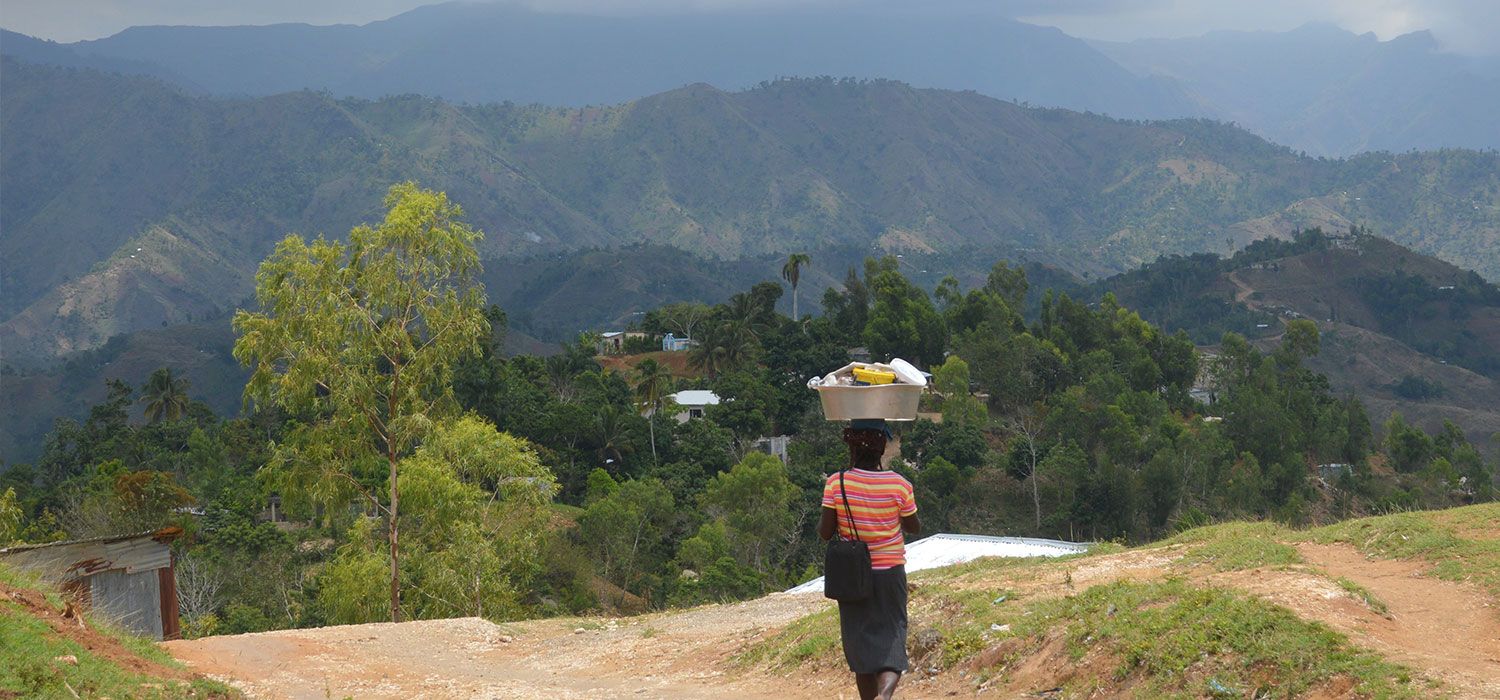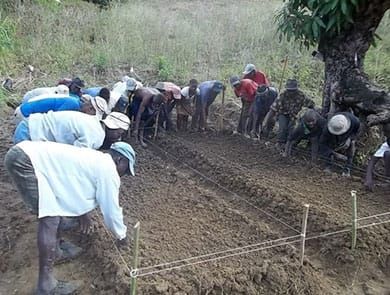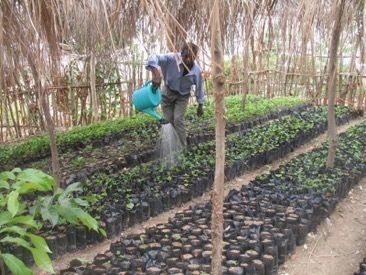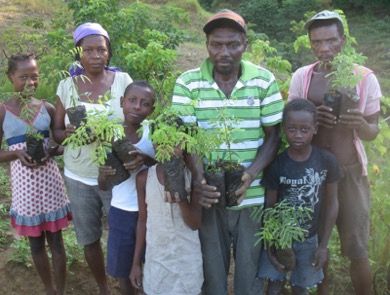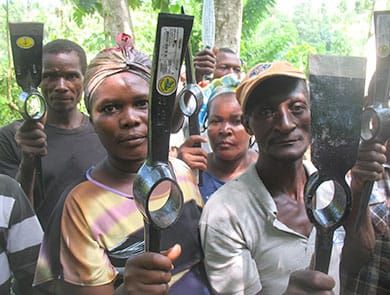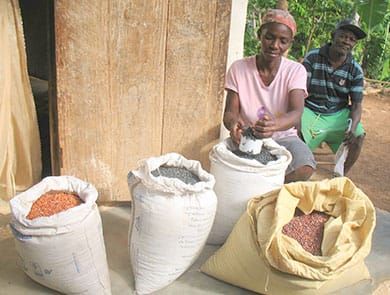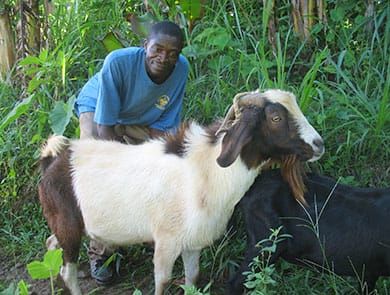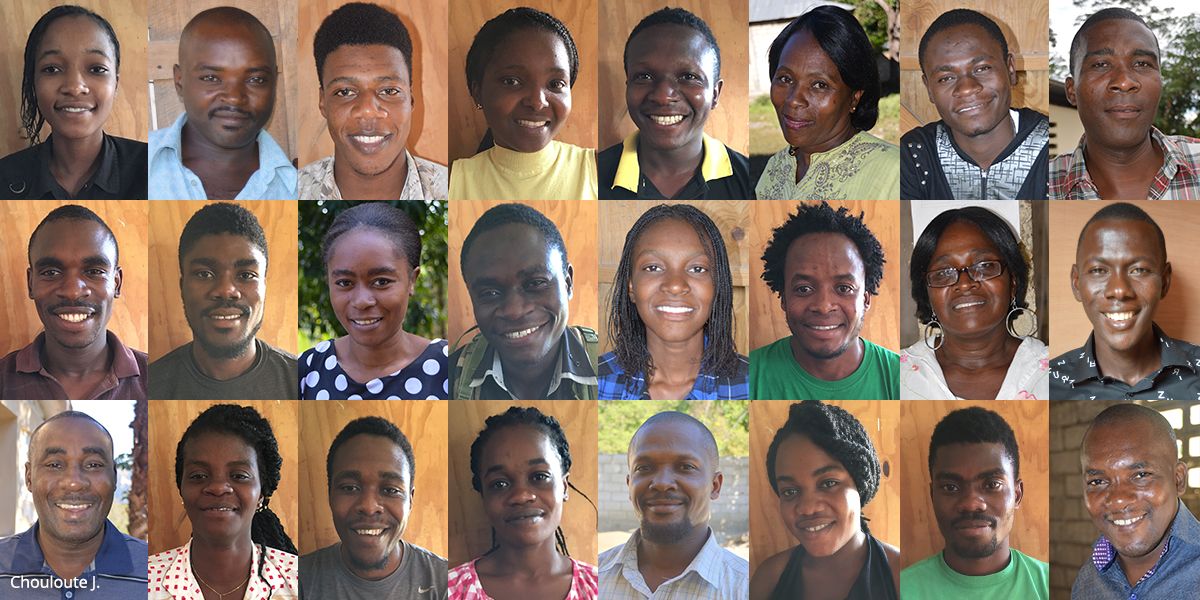A Model Twinning Relationship
Our Lady Queen of Peace (OLQP) Catholic Church in Arlington, Virginia became twinned with St. Joseph Church of Medor, Haiti in 1997 through the Parish Twinning Program of the Americas. The Haitian parish encompasses a rural community of 40,000 spread over 74 square miles in the mountains of central Haiti. Medor is far from the electric grid and has no running water, sewage, or trash disposal. Its roads are impassable most of the year. Most of the population is smallholder farmers.
OLQP has provided funds to build the primary and secondary schools in the parish, and continues to support a good portion of the expenses of the schools, as well as clean water, sanitation, health, and agro-forestry activities. The main objective is to help the people of Medor raise their own standard of living and to deepen the relationship between the people of both communities. The Haitians identify priorities, manage programs, and do the work in the community.
Agro-forestry is one of the most important and successful elements of the 27-year twinning relationship between OLQP and St. Joseph of Medor parish. Medor’s agro-forestry program addresses Haiti’s severe deforestation, which has created or exacerbated many of the nation’s major problems:
- floods and mudslides,
- lower water tables,
- loss of animal forage,
- poor growing conditions for crops, decreasing food security,
- contaminated water sources (which, in turn, contributes to waterborne diseases including cholera),
- loss of biodiversity, and
- local climate change
OLQP began agro-forestry efforts in Medor in 2010. Since 2014, a cooperative agreement between OLQP and the Smallholder Farmers Alliance (SFA) has been the basis for the program, which now includes tree planting, agricultural service, livestock and training programs in ten of the 12 chapel areas of the parish. SFA director Timote George inspires local farmers to carry out the agro-forestry program.
SFA has established 10 tree nurseries in St. Joseph parish. Local volunteers plant seeds and raise the seedlings through meticulous care and daily watering—even when the water must be carried long distances.
As the seedlings grow, the volunteers transfer them to larger containers. When the plants are ready, community members, including school children, transplant them on the mountainside as part of a work party known as a kombit. Participants learn to maintain trees that have been out planted in the communities and to curtail animals from free grazing in agricultural areas.
Since 2010, some 1,337,000 trees have been transplanted onto the mountainsides from the 10 tree nurseries in the 74-square-mile parish. Key to the program’s success is one-on-one and group training provided by SFA agronomists. The training enables the community and individual smallholder farmers to successfully maintain their trees and learn to be problem solvers instead of just beneficiaries. Women farmers are equal partners with the men in this training and in the entire program.
Another important element of the agro-forestry program is the mix of plants cultivated. They include trees that produce food such as oranges, breadfruit, and papaya for family use and sale; trees for timber and handicrafts; and coffee, which is a cash crop.
SFA also maintains a black bean and pigeon pea “seed bank” to help smallholder farmers begin or improve their harvests. Farmers who participate in the tree-growing program and help with the tree planting kombits receive an agricultural tool (for example, a hoe) and seeds from the seed bank. After harvest, the farmers return their original quantities of seed to the seed bank for others to use.
Medor’s agro-forestry program also has a livestock sharing component. Participants receive a goat. In return, they pass on their animals’ first offspring to another family. When the recipient of the offspring is able to pass an offspring on to another farmer, the recipient becomes the “owner” of the offspring he/she received.
Transforming Families’ Lives
Francois Pierre lives in the small community of Dodar in St. Joseph parish. His experiences with SFA programs are a good example of the positive difference they can make for a family. In 2013, he started participating in SFA’s tree nursery program and learned about agroforestry technology and environmental protection. With assistance from SFA, he built a tree plantation that currently is one of the most productive in the area.
In the first planting season of 2016, Mr. Pierre received 24 pounds of black bean seeds, which he planted in his garden plot. He harvested 192 pounds. After returning his initial amount to the seed bank, he sold some of the beans, kept some for his family to eat, and kept some to create his own personal seed bank. The money he made selling beans helped him repair his home, which was very old and vulnerable to storms. He also used seeds from his own stored seeds for the second 2016 planting, and did not require any support from SFA’s seed bank.
Also in 2016, SFA gave Mr. Pierre a goat. By the end of the year, he was able to pass along the first offspring to another farmer while keeping his mother goat. An SFA technician says a healthy male goat can be sold for at least US$120.

Mr. Pierre working in the tree nursery at the chapel area of Dodar.
Mr. Pierre’s situation has changed dramatically since he has participated in the SFA programs. He is economically more self-sufficient, uses more environmentally friendly practices, and is knowledgeable about better agricultural practices. SFA conducted a study in 2015, which found that families who participate in its tree nursery program increase their annual income an average of 50%.
The Raising Haiti Foundation applauds the twinning relationship between OLQP and the Medor community. It recognizes how advantageous a twinning relationship between a US based group and a Haitian community can be. It also recognizes the accomplishments achieved through the agro-forestry program in Medor and the other tree nurseries the SFA oversees. Raising Haiti Foundation’s goal is to link US groups with other Haitian communities so that many other smallholder farmers have access to the same kind of assistance. Raising Haiti Foundation began partnering with Our Lady Queen of Peace in 2021, helping fund Medor’s agro-forestry program.

